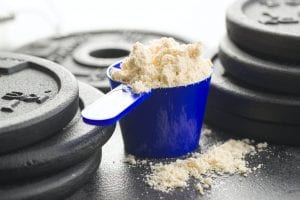If you’re trying to maximize your workouts, you might be looking at pre-workout supplements. But are they good or bad for you? Let’s find out.
The popularity of pre-workout supplements is due to their supposed benefits like boosting energy levels throughout workouts.
However, some experts disagree and believe that these supplements might not be good for your health.
Pre-Workout Supplements Explained
 Supplements (also known as pre-workouts) are multi-ingredient dietary formulas made to enhance workout performance.
Supplements (also known as pre-workouts) are multi-ingredient dietary formulas made to enhance workout performance.
Most supplements are available in powder form and you simply mix it in water and drink before a workout.
However, there are a lot of differences between pre-workouts regarding ingredients.
Some pre workout ingredients may be the same, such as creatine, caffeine, and B vitamins, but the quantities will differ.
Performance Boosting Ingredients
Although more research is necessary, some studies point to the effectiveness of certain ingredients.
The following are ingredients that research says may provide pre workout benefits.
Nitric Oxide Precursors
One of the main benefits of nitric oxide is its ability to improve blood circulation by relaxing blood vessels.
Supplements commonly contain compounds that produce nitric oxide in the body.
Some of these compounds include l-arginine, l-citrulline, and beetroot.
Studies suggest that these supplements may enhance oxygen and nutrient delivery to the muscles, therefore boosting workout performance.
Caffeine
Supplements that contain caffeine may help increase focus and energy.
As a popular stimulant, caffeine supplements may also help increase fat burning, alertness, and workouts.
Creatine
Supplements for pre-workouts commonly contain creatine, which helps in energy production and muscular strength.
Popular among bodybuilders and weightlifters, creatine supplements may improve strength, muscle mass, and recovery time.
Downsides of Pre-Workouts
 Before adding pre-workout supplements to your workout regimen, consider the following factors.
Before adding pre-workout supplements to your workout regimen, consider the following factors.
Sugar Alcohols and Artificial Sweeteners
Some common ingredients in supplements are sugar alcohol or artificial sweeteners.
These additives enhance the flavor and don’t add calories, but they may cause some pre workout side effects such as gas, bloating, and diarrhea in some people.
Your best bet is to either avoid supplements that contain large amounts of these additives or try them in small doses to check your tolerance.
Caffeine Excess
While caffeine may add some benefits to your workout routine, it may also lead to anxiety, trouble sleeping, and an increase in blood pressure.
If you regularly drink coffee, you might consume too much of it if you add caffeine supplements to your routine.
Quality and Safety
Supplements may not be closely regulated, depending on where they’re from, so it’s important to ensure their quality and safety.
The best way to do this is to ensure the supplements you’re taking are third-party tested.
While supplements may not be effective for everyone, it’s important to consider the pros and cons before adding them to your routine.

